Moudle7 Great books词汇短语句型精讲 课件(共54张PPT)
文档属性
| 名称 | Moudle7 Great books词汇短语句型精讲 课件(共54张PPT) | 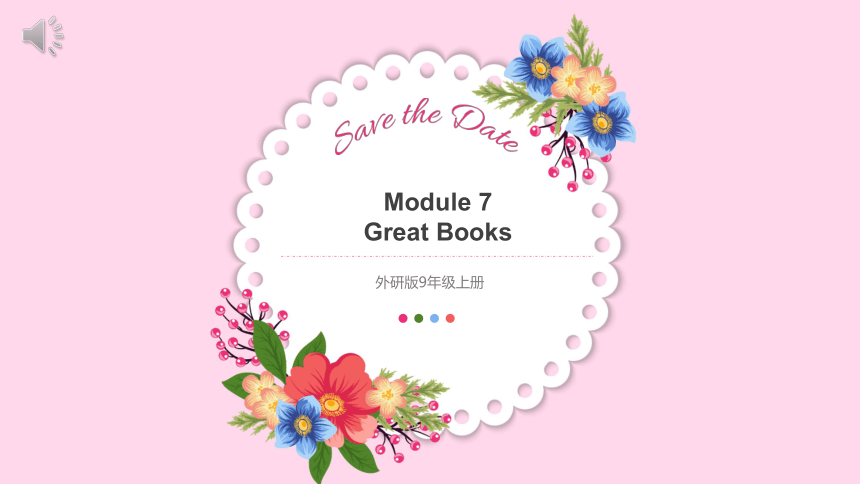 | |
| 格式 | pptx | ||
| 文件大小 | 14.4MB | ||
| 资源类型 | 教案 | ||
| 版本资源 | 外研版 | ||
| 科目 | 英语 | ||
| 更新时间 | 2021-07-21 08:22:01 | ||
图片预览

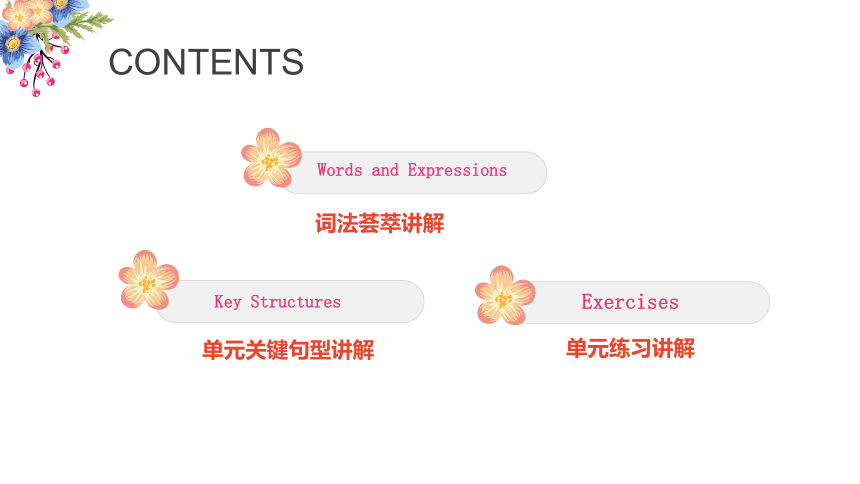
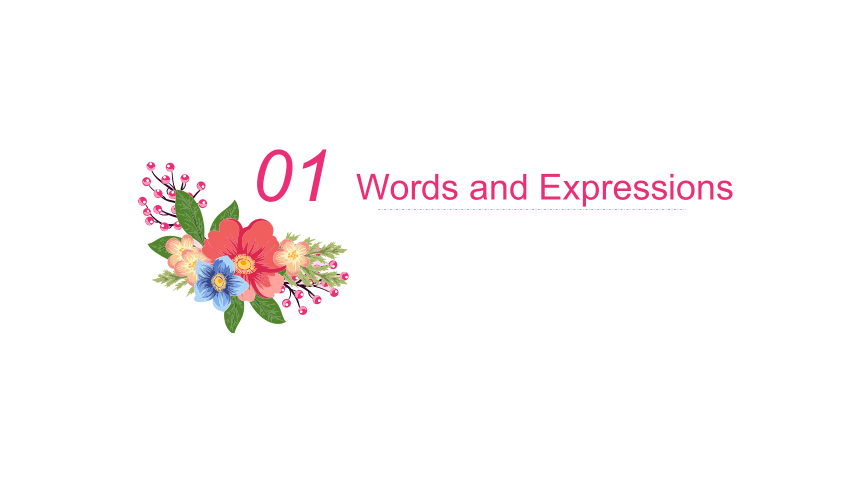
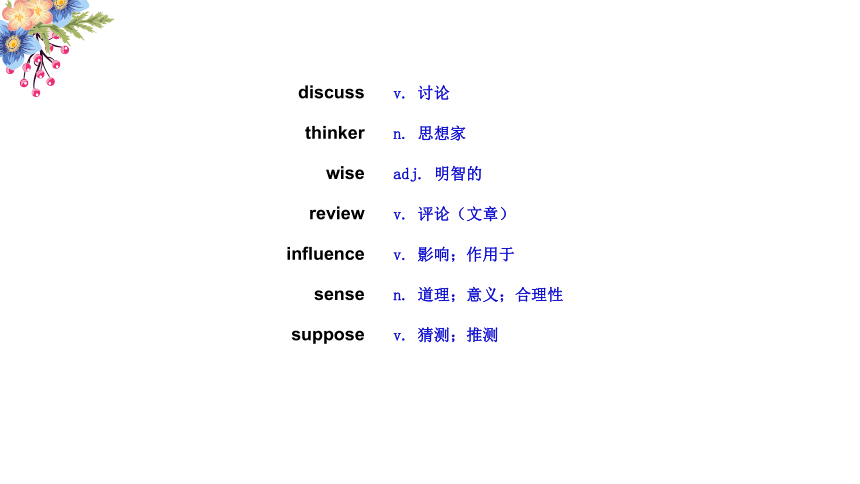
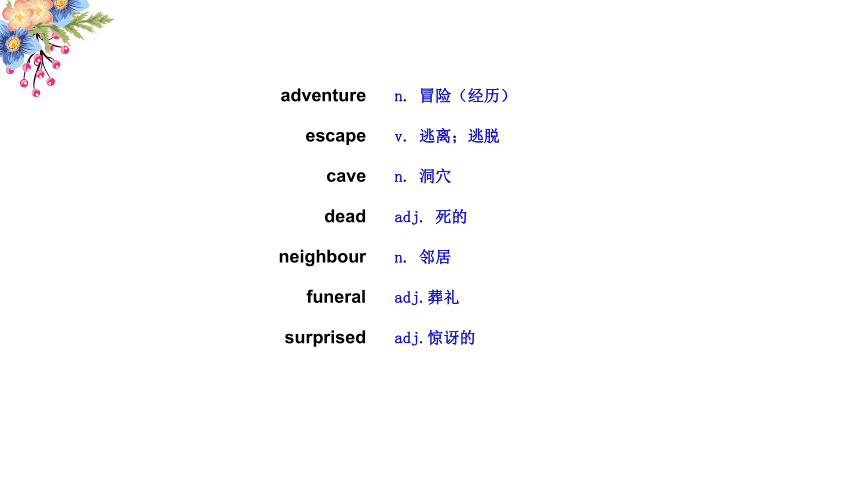
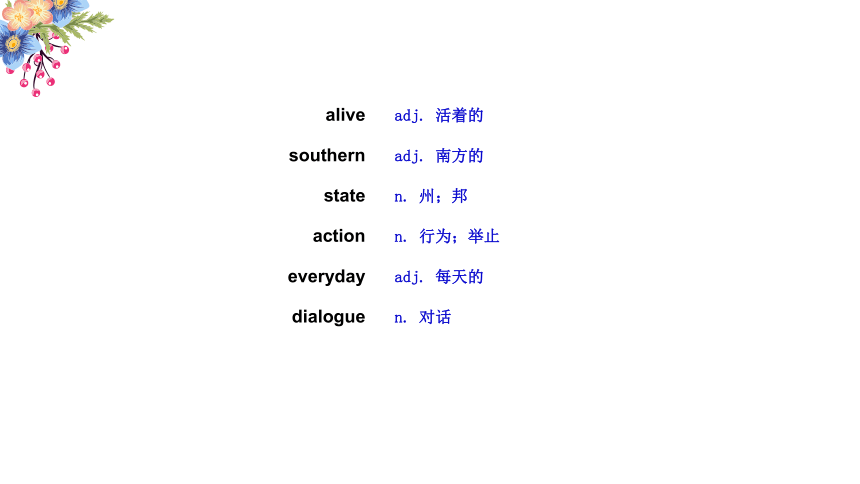

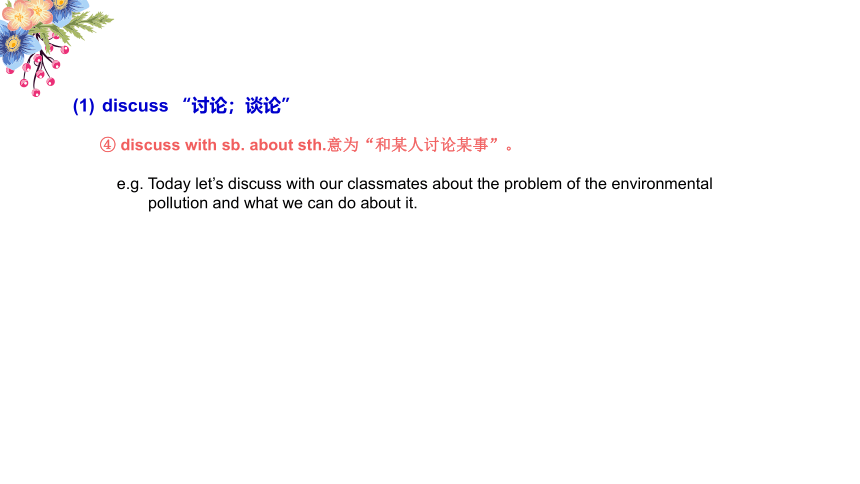
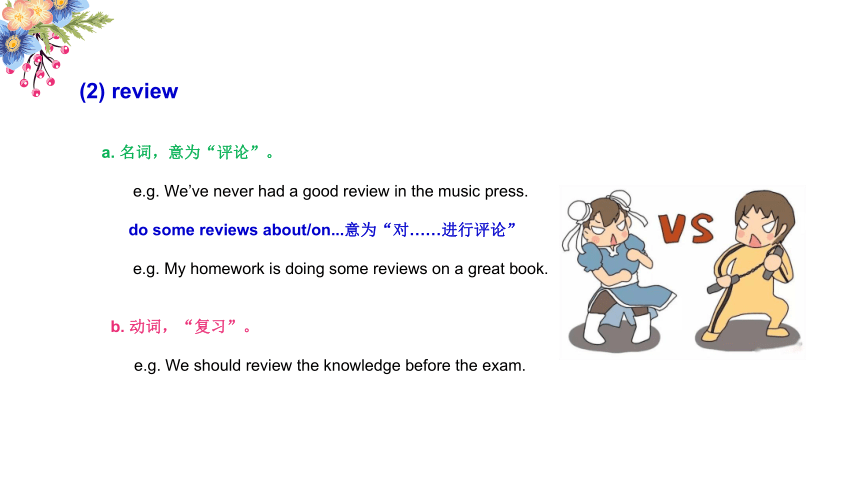
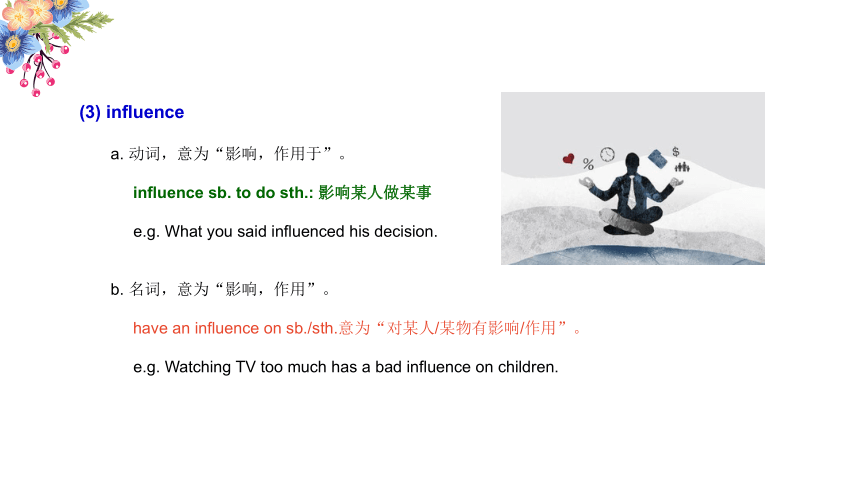
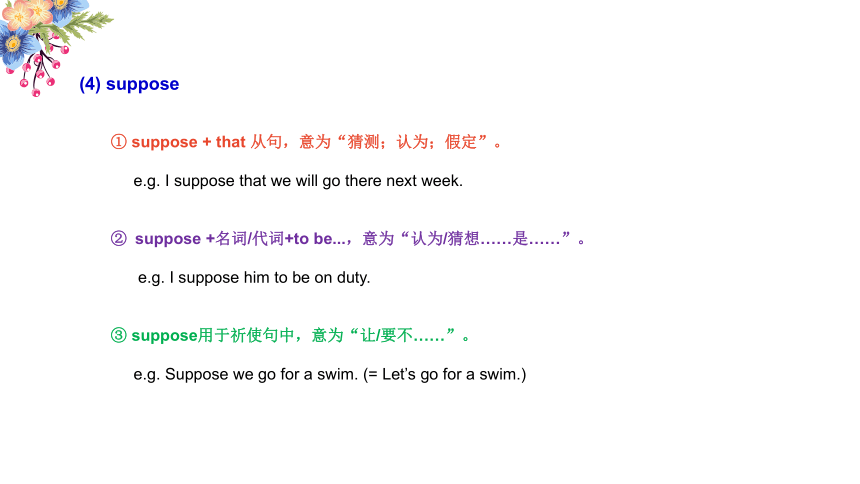
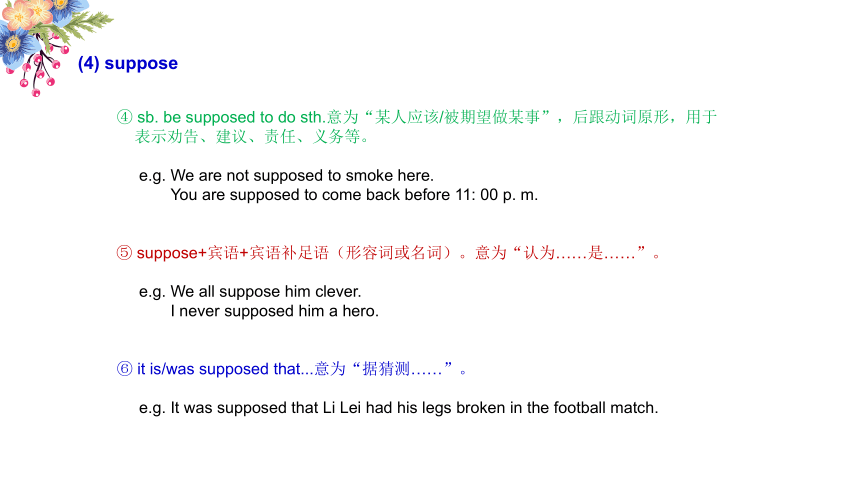
文档简介
(共54张PPT)
Module 7
Great Books
外研版9年级上册
词法荟萃讲解
Words and Expressions
单元关键句型讲解
Key Structures
CONTENTS
Exercises
单元练习讲解
01
Words and Expressions
discuss
thinker
wise
review
influence
sense
suppose
v. 讨论
n. 思想家
adj. 明智的
v. 评论(文章)
v. 影响;作用于
n. 道理;意义;合理性
v. 猜测;推测
adventure
escape
cave
dead
neighbour
funeral
surprised
n. 冒险(经历)
v. 逃离;逃脱
n. 洞穴
adj. 死的
n. 邻居
adj.葬礼
adj.惊讶的
alive
southern
state
action
everyday
dialogue
adj. 活着的
adj. 南方的
n. 州;邦
n. 行为;举止
adj. 每天的
n. 对话
discuss “讨论;谈论”
① discuss sb./sth.后接名词或代词,意为“讨论……”。
e.g. Let’s discuss the problem.
② discuss后接“宾语从句/疑问词+不定式”,意为“讨论……”。
e.g. We’ll discuss when to hold the meeting.
③ discuss sth. with sb.意为“和某人谈论某事”。
e.g. I want to discuss your homework with you.
discuss “讨论;谈论”
④ discuss with sb. about sth.意为“和某人讨论某事”。
e.g. Today let’s discuss with our classmates about the problem of the environmental
pollution and what we can do about it.
(2) review
a. 名词,意为“评论”。
e.g. We’ve never had a good review in the music press.
do some reviews about/on...意为“对……进行评论”
e.g. My homework is doing some reviews on a great book.
b. 动词,“复习”。
e.g. We should review the knowledge before the exam.
(3) influence
a. 动词,意为“影响,作用于”。
influence sb. to do sth.: 影响某人做某事
e.g. What you said influenced his decision.
b. 名词,意为“影响,作用”。
have an influence on sb./sth.意为“对某人/某物有影响/作用”。
e.g. Watching TV too much has a bad influence on children.
(4) suppose
① suppose + that 从句,意为“猜测;认为;假定”。
e.g. I suppose that we will go there next week.
suppose +名词/代词+to be...,意为“认为/猜想……是……”。
e.g. I suppose him to be on duty.
③ suppose用于祈使句中,意为“让/要不……”。
e.g. Suppose we go for a swim. (= Let’s go for a swim.)
(4) suppose
④ sb. be supposed to do sth.意为“某人应该/被期望做某事”,后跟动词原形,用于
表示劝告、建议、责任、义务等。
e.g. We are not supposed to smoke here.
You are supposed to come back before 11: 00 p. m.
⑤ suppose+宾语+宾语补足语(形容词或名词)。意为“认为……是……”。
e.g. We all suppose him clever.
I never supposed him a hero.
⑥ it is/was supposed that...意为“据猜测……”。
e.g. It was supposed that Li Lei had his legs broken in the football match.
(5) escape “逃跑,逃走”
escape from/out of意为“从……逃离/走/跑;逃脱”,相当于run away from;
e.g. The bird escaped from the cage yesterday.
escape 还可用作及物动词动词,意为“逃离;逃脱”,后接名词、代词或动名词作宾语,不用于被动语态,escape (doing) sth.意为“逃避(做)某事”。
e.g. Three prisoners have escaped.
(6) dead: 去世的
dead,die,death与dying的用法辨析
① dead 是形容词,意为“死的”,表示状态;
e.g. They found many dead birds on the beach.
② die意为“死,死亡”,是短暂性动词,不能和表示时间段的状语连用。
e.g. He died ten years ago.
(6) dead: 去世的
dead,die,death与dying的用法辨析
③ death是名词,意为“死,死亡”。
e.g. His death makes everyone sad.
④ dying 是动词die的-ing形式,也是形容词,意为“快要死的,垂死的”,常作表语或定语。
e.g. The fish is dying slowly.
(7) surprised
be surprised to do sth. 意为“对做某事感到惊讶”
e.g. We are surprised to see him here.
We’re surprised to get the surprising news from him.
(7) surprised
【拓展】与surprised有关的短语:
be surprised at sth. 对某事感到惊讶/吃惊;
in surprise吃惊地,惊奇地;
to one’s surprise 令某人吃惊的是,常常放在句首。
e.g. I was surprised at his answer.
She looked at her mother in surprise.
To my surprise, they invited Mike to the party as well.
(8) alive “活着的”
e.g. It can’t keep him alive. (作宾语补足语)
We don’t know whether he is alive. (作表语)
He is the greatest poet alive. (作后置定语)
I caught a bird alive in the tree. (作后置定语)
(9 ) southern “南方的;在南边的;来自南边的”
名词形式为south,意为“南边,南方”。
eastern在东边的;来自东边的;northern北方的;western西方的。
e.g. She lives in southern Italy.
The southern part of this city is very beautiful.
(10) every day
everyday与every day的用法辨析:
① everyday是形容词,意为“日常的;普通的”,在句中作定语。
e.g. Playing basketball is part of his everyday life.
The Internet has become part of our everyday life.
② every day是副词短语,意为“每天,天天”,在句中作状语。
e.g. That’s true. I read news on the Internet every day.
Lisa keeps on learning some everyday English every day.
make sense
by the way
get into trouble
run away
for a time
pay for
易理解;合情理
顺便提一下
遇上麻烦
逃跑
一小段时间
为…付出代价
great books
What’s up
describe (sb.) as ...
more...than...
write a review for
be influenced by
make sense (of )
by the way
名著
怎么了?
把(某人)描述为……
与其说……倒不如说……
为……写一篇评论
被……所影响
易理解;合情理;有意义
顺便说一下
think of
in the nineteenth century
as well-known as
be set in
the hero of the story
in the middle of
take away
at first
see sb. doing sth.
认为;觉得
在十九世纪
和……一样有名
以……为背景
故事的主角
在……中间
带走;拿走
首先;起初
看见某人正在做某事
be surprised to do sth
be pleased to do sth.
more than
at that time
in everyday English
be thought to be
turn round
做某事感到很吃惊
很乐意做某事
不仅仅是,不只是
在那时
用日常英语
被认为是
使好转;扭转
in return
be made into
used to do sth.
whether ... or not
in the form of
作为回报
被拍成
过去常常做某事
是否
以……的形式。
make sense“易理解;和情理”
make no sense意为“无意义”;
sth. make sense to sb.=sb. make sense of sth.意为“某事为某人所理解;某人理解某事” ;
make sense of sth. 意为“理解;明白”,指某人理解领会某一词句或别人说的话。
e.g. It would make sense to leave early.
What you have said doesn’t make sense to Tom.
Few tourists made sense of what the guide was saying.
In Mr Lu’s opinion, what Mark said makes no sense / doesn’t make sense.
by the way “顺便说/问/提一下;附带说”
e.g. By the way, has everybody arrived
【拓展】与way搭配的常用短语:
no way决不;
lose one’s way迷路;
on the way在路上;
in the way挡道;
in a/one way在某种程度上;
make one’s way to前往;
on one’s way to在某人去……的路上;
lead the way带路。
get into trouble “陷入麻烦”
get into trouble意为“陷入困境;惹上/遇上麻烦”,强调动作;
be in trouble意为“处于困境中;遇到麻烦”,强调状态。
e.g. Who will I call if I get into trouble
Can’t you stop your son from getting into trouble?
get into trouble “陷入麻烦”
【拓展】与trouble搭配的常用短语或句式:
ask for trouble自寻烦恼;
be in trouble处于困境中;遇到麻烦;
get sb. into trouble使某人陷入困境;
get (sb.) out of trouble (使某人)摆脱困境,逃离困境;
have trouble doing sth.做某事有困难;
What’s your trouble =What’s the trouble with you 你怎么了
run away
“run away to+地点”,意为“逃到……;跑到……”;
“run away from”意为“从……逃离/走/跑”。
e.g. The thief ran away quickly.
The prisoner has run away to the back of the hill.
The thief had run away when the policemen came.
They ran away from the terrible house quickly.
run away
“run away to+地点”,意为“逃到……;跑到……”;
“run away from”意为“从……逃离/走/跑”。
【拓展】与run搭配的常用短语:
run across偶然遇到;
run after追赶;
run into撞上;
run out用尽;用完。
for a time “一小段时间;一度;一时”
e.g. He lived for a time in Spain.
For a time, the little boy lived with his uncle.
I worked at a high-school library for a time.
Mr. Black lived for a time in the house next to ours.
02
Key structures
What’s up 怎么了/出什么事了?
What’s up 是口语中常用的一个句式,用来询问对方“怎么了?/有什么事?”;
What’s up = What’s happening =What’s the matter =What’s wrong
=What’s the trouble =What’s going on
若要问某人或某事怎么了,可以在句末加上with sb./sth.
e.g. What’s up You look very worried.
What’s up Why is the baby crying
I accept that they’re great because their works are still read by many people today.
我承认他们都很伟大,因为至今还有很多人在阅读他们的著作。
【辨析】accept与receive的用法辨析:
① accept 是动词,意为“接受;答应”,表示主动而且高兴地接受,强调主观愿望。
e.g. Charlie accepted 2, 000 dollars as a reward happily.
I had thought my teacher would accept the present, but he refused.
【拓展】accept的反义词是refuse, refuse作动词,意为“拒绝,回绝”
常用于refuse sth /to do sth. 结构。
I accept that they’re great because their works are still read by many people today.
我承认他们都很伟大,因为至今还有很多人在阅读他们的著作。
【辨析】accept与receive的用法辨析:
② receive是动词,意为“收到”,强调客观收到,但主观上不一定接受。
e.g. Lucy has received his present, but she will not accept it.
She received a lot of money yesterday, but she didn’t accept it.
But I think I’d describe Confucius more as a teacher and thinker than a writer. 我更愿意把孔子描述为教师兼思想家,而非作家。
describe…as…意思是“把……描述为……”,
describe sb./sth. to sb. 意为“向某人描述某人/某物” 。
e.g. She is describing her childhood to us.
The old man described himself to people.
【拓展】see...as...把……看着……;regard...as...认为……是……。
But I think I’d describe Confucius more as a teacher and thinker than a writer. 我更愿意把孔子描述为教师兼思想家,而非作家。
(2) more…than… 在本文中指“与其说……倒不如说……”。在该结构中,肯定more后面的内容,否
定than后面的内容。
另外,more…than...还可译为“比……更(形容词和副词的比较级)”。
e.g. Success is more hard work than good luck.
He is more a thinker than a teacher.
She is more beautiful than her sister.
But I think I’d describe Confucius more as a teacher and thinker than a writer. 我更愿意把孔子描述为教师兼思想家,而非作家。
【拓展】more than=over意为“超过;不只是……”。
e.g. More than one answer is to your question.
There are more than 900 students in our school.
Beijing is a city with a population of more than ten million.
But I think I’d describe Confucius more as a teacher and thinker than a writer. 我更愿意把孔子描述为教师兼思想家,而非作家。
a teacher and thinker意为“一位教育家兼思想家”,指一个人,作主语时,谓语动词用单数形式。
a teacher and a thinker意为“一位教育家和一位思想家”,指两个人,作主语时,谓语动词用复数形式。
e.g. The writer and teacher is coming.
Their teacher and friend is Mr. Li.
A writer and a teacher are coming to our school tomorrow.
He was important, but I suppose he isn’t as well-known as Confucius or Shakespeare. 他是一位重要的作家,但我觉得他不像孔子和萨士比亚那么有名。
【辨析】be well-known/famous as,be well-known/famous for与be well-known/famous to的用法辨析:
① be well-known/famous as意为“作为……而出名/著名/闻名”,表示人“以某种身份或职业而出名”;
表示某地“作为某物的产地或某种地方而出名”;表示某事物“以某种形式而出名”。
e.g. Lu Xun was famous as a writer.
Hangzhou is famous as a tourist place.
This book is famous as a conference book.
He was important, but I suppose he isn’t as well-known as Confucius or Shakespeare. 他是一位重要的作家,但我觉得他不像孔子和萨士比亚那么有名。
【辨析】be well-known/famous as,be well-known/famous for与be well-known/famous to的用法辨析:
②be well-known/famous for意为“因……而出名/著名/闻名”,后接出名的原因,相当于be well-known for。
表示人“以某种知识技能、作品或特征而出名”;
表示某地“以某种特产或特征而出名”;
表示某事物“因其内容、特征、价值等而被人而所知”。
Hangzhou is well-known /famous for the West Lake. 杭州因西湖而闻名。
Yuan Longping is well-known /famous for hybrid rice. 袁隆平因杂交水稻而著名。
This grammar book is famous for its practical usage. 这本语法书以其实用性而被人所知。
He was important, but I suppose he isn’t as well-known as Confucius or Shakespeare. 他是一位重要的作家,但我觉得他不像孔子和萨士比亚那么有名。
【辨析】be well-known/famous as,be well-known/famous for与be well-known/famous to的用法辨析:
③ be well-known/famous to意为“广为人知,为……所熟知”,其后的名词一般是人。
His play is well-known /famous to us.
Chairman Mao is famous to every Chinese.
Why are popular books made into films 为什么畅销书被制成电影?
【辨析】be made into, be made of, be made from与be made up of的用法辨析:
① be made into意为“被制成……”,通常指某种原材料被制成某种成品。
In many parts of the world corn is made into powder. 在世界许多地方玉米被制成粉。
We can make glass into different kinds of things. 我们可以把玻璃制成各种东西。
② be made of原为be made out of常被省略。意为“由……制成”,指从原料到制成品,只发生了形状变化,没有发生本质变化(属物理变化)。
The cloth is made of cotton. 这种布是用棉花制成的。
Why are popular books made into films 为什么畅销书被制成电影?
【辨析】be made into, be made of, be made from与be made up of的用法辨析:
③ be made from意为“由……制成”,指从原料到制成品,发生了质的变化,已无法复原(属化学变化)。
Gas is made from coal. 煤气由煤制成。
This kind of wine is made from rice. 这种酒是米制成的。
④ be made up of意为“由……构成(组成)”,强调主语由两部分或两个以上的部分构成或组成。
The article is made up of four parts. 这篇文章有四部分组成。
【注】be made of,be made into和make…into…许多时候可互换使用。
面包是由面粉做成的。
Bread is made of flour.
=Flour can be made into bread.
=We can make flour into bread.
=We can make bread (out) of flour.
Why are popular books made into films 为什么畅销书被制成电影?
03
Exercise
1. Lu Xun is known_____ not only a great writer but also a great thinker.
A. to B. for C. with D. as
2. _______ people in our city have passed the driving test.
A. Two hundreds of B. Two hundred of C. Two hundreds D. Two hundred
3.—Hi, Daisy, how is it going
—Not bad. ________, how are you getting along with your new friend, Tom
A. In the way B. By the way C. In a way D. On the way
4. The dog took a piece of meat and .
A. put away B. took off C. ran away D. saw off
5. —What are you _____
—I’m getting ready for my math test.
A. cooking B. going C. up D. up to
6. The young man is thought _______ the smartest in his town.
A. to be B. be C. as D. of
7. Millions of tourists______ to Mount Tai every year.
A. attract B. have attracted C. are attracting D. are attracted
8. Mr Smith is ________ an educator and an actor ________ a leader.
A.much, as B. more, as C. more, than D. much, than
9. The old man told us an _______ story and we were all very _______.
A. excited, excited B. exciting, exciting
C. excited, exciting D. exciting, excited
10. I hope to have a house ____ a kitchen so that I can save money by cooking food by myself.
A. have B. has C. without D. with
11.-Can you imagine ________ in such a hot room for two months
-Sorry, I can’t.
A. live B. to live C. lived D. living
12. They kept _________ for him in front of the school.
A. wait B. waiting C. to wait D. waits
13. To the teacher’s _______, the boy finished the task on time.
A. surprise B.surprised C.surprising D.surprises
14. The little girl was very sad, because her pet cat _______.
A. die B. death C. dead D. died
15.— Lucy looks sad because she didn’t pass the exam.
— _________! She spent a lot of time on it.
A. Oh, really B. What a pity C. I think she hasn’t D. I hope so.
1. Lu Xun is known_____ not only a great writer but also a great thinker.
A. to B. for C. with D. as
2. _______ people in our city have passed the driving test.
A. Two hundreds of B. Two hundred of C. Two hundreds D. Two hundred
3.—Hi, Daisy, how is it going
—Not bad. ________, how are you getting along with your new friend, Tom
A. In the way B. By the way C. In a way D. On the way
4. The dog took a piece of meat and .
A. put away B. took off C. ran away D. saw off
5. —What are you _____
—I’m getting ready for my math test.
A. cooking B. going C. up D. up to
D
D
B
C
D
6. The young man is thought _______ the smartest in his town.
A. to be B. be C. as D. of
7. Millions of tourists______ to Mount Tai every year.
A. attract B. have attracted C. are attracting D. are attracted
8. Mr Smith is ________ an educator and an actor ________ a leader.
A.much, as B. more, as C. more, than D. much, than
9. The old man told us an _______ story and we were all very _______.
A. excited, excited B. exciting, exciting
C. excited, exciting D. exciting, excited
10. I hope to have a house ____ a kitchen so that I can save money by cooking food by myself.
A. have B. has C. without D. with
D
A
C
D
D
11.-Can you imagine ________ in such a hot room for two months
-Sorry, I can’t.
A. live B. to live C. lived D. living
12. They kept _________ for him in front of the school.
A. wait B. waiting C. to wait D. waits
13. To the teacher’s _______, the boy finished the task on time.
A. surprise B.surprised C.surprising D.surprises
14. The little girl was very sad, because her pet cat _______.
A. die B. death C. dead D. died
15.— Lucy looks sad because she didn’t pass the exam.
— _________! She spent a lot of time on it.
A. Oh, really B. What a pity C. I think she hasn’t D. I hope so.
D
B
A
D
B
感谢您的观看
Module 7
Great Books
外研版9年级上册
词法荟萃讲解
Words and Expressions
单元关键句型讲解
Key Structures
CONTENTS
Exercises
单元练习讲解
01
Words and Expressions
discuss
thinker
wise
review
influence
sense
suppose
v. 讨论
n. 思想家
adj. 明智的
v. 评论(文章)
v. 影响;作用于
n. 道理;意义;合理性
v. 猜测;推测
adventure
escape
cave
dead
neighbour
funeral
surprised
n. 冒险(经历)
v. 逃离;逃脱
n. 洞穴
adj. 死的
n. 邻居
adj.葬礼
adj.惊讶的
alive
southern
state
action
everyday
dialogue
adj. 活着的
adj. 南方的
n. 州;邦
n. 行为;举止
adj. 每天的
n. 对话
discuss “讨论;谈论”
① discuss sb./sth.后接名词或代词,意为“讨论……”。
e.g. Let’s discuss the problem.
② discuss后接“宾语从句/疑问词+不定式”,意为“讨论……”。
e.g. We’ll discuss when to hold the meeting.
③ discuss sth. with sb.意为“和某人谈论某事”。
e.g. I want to discuss your homework with you.
discuss “讨论;谈论”
④ discuss with sb. about sth.意为“和某人讨论某事”。
e.g. Today let’s discuss with our classmates about the problem of the environmental
pollution and what we can do about it.
(2) review
a. 名词,意为“评论”。
e.g. We’ve never had a good review in the music press.
do some reviews about/on...意为“对……进行评论”
e.g. My homework is doing some reviews on a great book.
b. 动词,“复习”。
e.g. We should review the knowledge before the exam.
(3) influence
a. 动词,意为“影响,作用于”。
influence sb. to do sth.: 影响某人做某事
e.g. What you said influenced his decision.
b. 名词,意为“影响,作用”。
have an influence on sb./sth.意为“对某人/某物有影响/作用”。
e.g. Watching TV too much has a bad influence on children.
(4) suppose
① suppose + that 从句,意为“猜测;认为;假定”。
e.g. I suppose that we will go there next week.
suppose +名词/代词+to be...,意为“认为/猜想……是……”。
e.g. I suppose him to be on duty.
③ suppose用于祈使句中,意为“让/要不……”。
e.g. Suppose we go for a swim. (= Let’s go for a swim.)
(4) suppose
④ sb. be supposed to do sth.意为“某人应该/被期望做某事”,后跟动词原形,用于
表示劝告、建议、责任、义务等。
e.g. We are not supposed to smoke here.
You are supposed to come back before 11: 00 p. m.
⑤ suppose+宾语+宾语补足语(形容词或名词)。意为“认为……是……”。
e.g. We all suppose him clever.
I never supposed him a hero.
⑥ it is/was supposed that...意为“据猜测……”。
e.g. It was supposed that Li Lei had his legs broken in the football match.
(5) escape “逃跑,逃走”
escape from/out of意为“从……逃离/走/跑;逃脱”,相当于run away from;
e.g. The bird escaped from the cage yesterday.
escape 还可用作及物动词动词,意为“逃离;逃脱”,后接名词、代词或动名词作宾语,不用于被动语态,escape (doing) sth.意为“逃避(做)某事”。
e.g. Three prisoners have escaped.
(6) dead: 去世的
dead,die,death与dying的用法辨析
① dead 是形容词,意为“死的”,表示状态;
e.g. They found many dead birds on the beach.
② die意为“死,死亡”,是短暂性动词,不能和表示时间段的状语连用。
e.g. He died ten years ago.
(6) dead: 去世的
dead,die,death与dying的用法辨析
③ death是名词,意为“死,死亡”。
e.g. His death makes everyone sad.
④ dying 是动词die的-ing形式,也是形容词,意为“快要死的,垂死的”,常作表语或定语。
e.g. The fish is dying slowly.
(7) surprised
be surprised to do sth. 意为“对做某事感到惊讶”
e.g. We are surprised to see him here.
We’re surprised to get the surprising news from him.
(7) surprised
【拓展】与surprised有关的短语:
be surprised at sth. 对某事感到惊讶/吃惊;
in surprise吃惊地,惊奇地;
to one’s surprise 令某人吃惊的是,常常放在句首。
e.g. I was surprised at his answer.
She looked at her mother in surprise.
To my surprise, they invited Mike to the party as well.
(8) alive “活着的”
e.g. It can’t keep him alive. (作宾语补足语)
We don’t know whether he is alive. (作表语)
He is the greatest poet alive. (作后置定语)
I caught a bird alive in the tree. (作后置定语)
(9 ) southern “南方的;在南边的;来自南边的”
名词形式为south,意为“南边,南方”。
eastern在东边的;来自东边的;northern北方的;western西方的。
e.g. She lives in southern Italy.
The southern part of this city is very beautiful.
(10) every day
everyday与every day的用法辨析:
① everyday是形容词,意为“日常的;普通的”,在句中作定语。
e.g. Playing basketball is part of his everyday life.
The Internet has become part of our everyday life.
② every day是副词短语,意为“每天,天天”,在句中作状语。
e.g. That’s true. I read news on the Internet every day.
Lisa keeps on learning some everyday English every day.
make sense
by the way
get into trouble
run away
for a time
pay for
易理解;合情理
顺便提一下
遇上麻烦
逃跑
一小段时间
为…付出代价
great books
What’s up
describe (sb.) as ...
more...than...
write a review for
be influenced by
make sense (of )
by the way
名著
怎么了?
把(某人)描述为……
与其说……倒不如说……
为……写一篇评论
被……所影响
易理解;合情理;有意义
顺便说一下
think of
in the nineteenth century
as well-known as
be set in
the hero of the story
in the middle of
take away
at first
see sb. doing sth.
认为;觉得
在十九世纪
和……一样有名
以……为背景
故事的主角
在……中间
带走;拿走
首先;起初
看见某人正在做某事
be surprised to do sth
be pleased to do sth.
more than
at that time
in everyday English
be thought to be
turn round
做某事感到很吃惊
很乐意做某事
不仅仅是,不只是
在那时
用日常英语
被认为是
使好转;扭转
in return
be made into
used to do sth.
whether ... or not
in the form of
作为回报
被拍成
过去常常做某事
是否
以……的形式。
make sense“易理解;和情理”
make no sense意为“无意义”;
sth. make sense to sb.=sb. make sense of sth.意为“某事为某人所理解;某人理解某事” ;
make sense of sth. 意为“理解;明白”,指某人理解领会某一词句或别人说的话。
e.g. It would make sense to leave early.
What you have said doesn’t make sense to Tom.
Few tourists made sense of what the guide was saying.
In Mr Lu’s opinion, what Mark said makes no sense / doesn’t make sense.
by the way “顺便说/问/提一下;附带说”
e.g. By the way, has everybody arrived
【拓展】与way搭配的常用短语:
no way决不;
lose one’s way迷路;
on the way在路上;
in the way挡道;
in a/one way在某种程度上;
make one’s way to前往;
on one’s way to在某人去……的路上;
lead the way带路。
get into trouble “陷入麻烦”
get into trouble意为“陷入困境;惹上/遇上麻烦”,强调动作;
be in trouble意为“处于困境中;遇到麻烦”,强调状态。
e.g. Who will I call if I get into trouble
Can’t you stop your son from getting into trouble?
get into trouble “陷入麻烦”
【拓展】与trouble搭配的常用短语或句式:
ask for trouble自寻烦恼;
be in trouble处于困境中;遇到麻烦;
get sb. into trouble使某人陷入困境;
get (sb.) out of trouble (使某人)摆脱困境,逃离困境;
have trouble doing sth.做某事有困难;
What’s your trouble =What’s the trouble with you 你怎么了
run away
“run away to+地点”,意为“逃到……;跑到……”;
“run away from”意为“从……逃离/走/跑”。
e.g. The thief ran away quickly.
The prisoner has run away to the back of the hill.
The thief had run away when the policemen came.
They ran away from the terrible house quickly.
run away
“run away to+地点”,意为“逃到……;跑到……”;
“run away from”意为“从……逃离/走/跑”。
【拓展】与run搭配的常用短语:
run across偶然遇到;
run after追赶;
run into撞上;
run out用尽;用完。
for a time “一小段时间;一度;一时”
e.g. He lived for a time in Spain.
For a time, the little boy lived with his uncle.
I worked at a high-school library for a time.
Mr. Black lived for a time in the house next to ours.
02
Key structures
What’s up 怎么了/出什么事了?
What’s up 是口语中常用的一个句式,用来询问对方“怎么了?/有什么事?”;
What’s up = What’s happening =What’s the matter =What’s wrong
=What’s the trouble =What’s going on
若要问某人或某事怎么了,可以在句末加上with sb./sth.
e.g. What’s up You look very worried.
What’s up Why is the baby crying
I accept that they’re great because their works are still read by many people today.
我承认他们都很伟大,因为至今还有很多人在阅读他们的著作。
【辨析】accept与receive的用法辨析:
① accept 是动词,意为“接受;答应”,表示主动而且高兴地接受,强调主观愿望。
e.g. Charlie accepted 2, 000 dollars as a reward happily.
I had thought my teacher would accept the present, but he refused.
【拓展】accept的反义词是refuse, refuse作动词,意为“拒绝,回绝”
常用于refuse sth /to do sth. 结构。
I accept that they’re great because their works are still read by many people today.
我承认他们都很伟大,因为至今还有很多人在阅读他们的著作。
【辨析】accept与receive的用法辨析:
② receive是动词,意为“收到”,强调客观收到,但主观上不一定接受。
e.g. Lucy has received his present, but she will not accept it.
She received a lot of money yesterday, but she didn’t accept it.
But I think I’d describe Confucius more as a teacher and thinker than a writer. 我更愿意把孔子描述为教师兼思想家,而非作家。
describe…as…意思是“把……描述为……”,
describe sb./sth. to sb. 意为“向某人描述某人/某物” 。
e.g. She is describing her childhood to us.
The old man described himself to people.
【拓展】see...as...把……看着……;regard...as...认为……是……。
But I think I’d describe Confucius more as a teacher and thinker than a writer. 我更愿意把孔子描述为教师兼思想家,而非作家。
(2) more…than… 在本文中指“与其说……倒不如说……”。在该结构中,肯定more后面的内容,否
定than后面的内容。
另外,more…than...还可译为“比……更(形容词和副词的比较级)”。
e.g. Success is more hard work than good luck.
He is more a thinker than a teacher.
She is more beautiful than her sister.
But I think I’d describe Confucius more as a teacher and thinker than a writer. 我更愿意把孔子描述为教师兼思想家,而非作家。
【拓展】more than=over意为“超过;不只是……”。
e.g. More than one answer is to your question.
There are more than 900 students in our school.
Beijing is a city with a population of more than ten million.
But I think I’d describe Confucius more as a teacher and thinker than a writer. 我更愿意把孔子描述为教师兼思想家,而非作家。
a teacher and thinker意为“一位教育家兼思想家”,指一个人,作主语时,谓语动词用单数形式。
a teacher and a thinker意为“一位教育家和一位思想家”,指两个人,作主语时,谓语动词用复数形式。
e.g. The writer and teacher is coming.
Their teacher and friend is Mr. Li.
A writer and a teacher are coming to our school tomorrow.
He was important, but I suppose he isn’t as well-known as Confucius or Shakespeare. 他是一位重要的作家,但我觉得他不像孔子和萨士比亚那么有名。
【辨析】be well-known/famous as,be well-known/famous for与be well-known/famous to的用法辨析:
① be well-known/famous as意为“作为……而出名/著名/闻名”,表示人“以某种身份或职业而出名”;
表示某地“作为某物的产地或某种地方而出名”;表示某事物“以某种形式而出名”。
e.g. Lu Xun was famous as a writer.
Hangzhou is famous as a tourist place.
This book is famous as a conference book.
He was important, but I suppose he isn’t as well-known as Confucius or Shakespeare. 他是一位重要的作家,但我觉得他不像孔子和萨士比亚那么有名。
【辨析】be well-known/famous as,be well-known/famous for与be well-known/famous to的用法辨析:
②be well-known/famous for意为“因……而出名/著名/闻名”,后接出名的原因,相当于be well-known for。
表示人“以某种知识技能、作品或特征而出名”;
表示某地“以某种特产或特征而出名”;
表示某事物“因其内容、特征、价值等而被人而所知”。
Hangzhou is well-known /famous for the West Lake. 杭州因西湖而闻名。
Yuan Longping is well-known /famous for hybrid rice. 袁隆平因杂交水稻而著名。
This grammar book is famous for its practical usage. 这本语法书以其实用性而被人所知。
He was important, but I suppose he isn’t as well-known as Confucius or Shakespeare. 他是一位重要的作家,但我觉得他不像孔子和萨士比亚那么有名。
【辨析】be well-known/famous as,be well-known/famous for与be well-known/famous to的用法辨析:
③ be well-known/famous to意为“广为人知,为……所熟知”,其后的名词一般是人。
His play is well-known /famous to us.
Chairman Mao is famous to every Chinese.
Why are popular books made into films 为什么畅销书被制成电影?
【辨析】be made into, be made of, be made from与be made up of的用法辨析:
① be made into意为“被制成……”,通常指某种原材料被制成某种成品。
In many parts of the world corn is made into powder. 在世界许多地方玉米被制成粉。
We can make glass into different kinds of things. 我们可以把玻璃制成各种东西。
② be made of原为be made out of常被省略。意为“由……制成”,指从原料到制成品,只发生了形状变化,没有发生本质变化(属物理变化)。
The cloth is made of cotton. 这种布是用棉花制成的。
Why are popular books made into films 为什么畅销书被制成电影?
【辨析】be made into, be made of, be made from与be made up of的用法辨析:
③ be made from意为“由……制成”,指从原料到制成品,发生了质的变化,已无法复原(属化学变化)。
Gas is made from coal. 煤气由煤制成。
This kind of wine is made from rice. 这种酒是米制成的。
④ be made up of意为“由……构成(组成)”,强调主语由两部分或两个以上的部分构成或组成。
The article is made up of four parts. 这篇文章有四部分组成。
【注】be made of,be made into和make…into…许多时候可互换使用。
面包是由面粉做成的。
Bread is made of flour.
=Flour can be made into bread.
=We can make flour into bread.
=We can make bread (out) of flour.
Why are popular books made into films 为什么畅销书被制成电影?
03
Exercise
1. Lu Xun is known_____ not only a great writer but also a great thinker.
A. to B. for C. with D. as
2. _______ people in our city have passed the driving test.
A. Two hundreds of B. Two hundred of C. Two hundreds D. Two hundred
3.—Hi, Daisy, how is it going
—Not bad. ________, how are you getting along with your new friend, Tom
A. In the way B. By the way C. In a way D. On the way
4. The dog took a piece of meat and .
A. put away B. took off C. ran away D. saw off
5. —What are you _____
—I’m getting ready for my math test.
A. cooking B. going C. up D. up to
6. The young man is thought _______ the smartest in his town.
A. to be B. be C. as D. of
7. Millions of tourists______ to Mount Tai every year.
A. attract B. have attracted C. are attracting D. are attracted
8. Mr Smith is ________ an educator and an actor ________ a leader.
A.much, as B. more, as C. more, than D. much, than
9. The old man told us an _______ story and we were all very _______.
A. excited, excited B. exciting, exciting
C. excited, exciting D. exciting, excited
10. I hope to have a house ____ a kitchen so that I can save money by cooking food by myself.
A. have B. has C. without D. with
11.-Can you imagine ________ in such a hot room for two months
-Sorry, I can’t.
A. live B. to live C. lived D. living
12. They kept _________ for him in front of the school.
A. wait B. waiting C. to wait D. waits
13. To the teacher’s _______, the boy finished the task on time.
A. surprise B.surprised C.surprising D.surprises
14. The little girl was very sad, because her pet cat _______.
A. die B. death C. dead D. died
15.— Lucy looks sad because she didn’t pass the exam.
— _________! She spent a lot of time on it.
A. Oh, really B. What a pity C. I think she hasn’t D. I hope so.
1. Lu Xun is known_____ not only a great writer but also a great thinker.
A. to B. for C. with D. as
2. _______ people in our city have passed the driving test.
A. Two hundreds of B. Two hundred of C. Two hundreds D. Two hundred
3.—Hi, Daisy, how is it going
—Not bad. ________, how are you getting along with your new friend, Tom
A. In the way B. By the way C. In a way D. On the way
4. The dog took a piece of meat and .
A. put away B. took off C. ran away D. saw off
5. —What are you _____
—I’m getting ready for my math test.
A. cooking B. going C. up D. up to
D
D
B
C
D
6. The young man is thought _______ the smartest in his town.
A. to be B. be C. as D. of
7. Millions of tourists______ to Mount Tai every year.
A. attract B. have attracted C. are attracting D. are attracted
8. Mr Smith is ________ an educator and an actor ________ a leader.
A.much, as B. more, as C. more, than D. much, than
9. The old man told us an _______ story and we were all very _______.
A. excited, excited B. exciting, exciting
C. excited, exciting D. exciting, excited
10. I hope to have a house ____ a kitchen so that I can save money by cooking food by myself.
A. have B. has C. without D. with
D
A
C
D
D
11.-Can you imagine ________ in such a hot room for two months
-Sorry, I can’t.
A. live B. to live C. lived D. living
12. They kept _________ for him in front of the school.
A. wait B. waiting C. to wait D. waits
13. To the teacher’s _______, the boy finished the task on time.
A. surprise B.surprised C.surprising D.surprises
14. The little girl was very sad, because her pet cat _______.
A. die B. death C. dead D. died
15.— Lucy looks sad because she didn’t pass the exam.
— _________! She spent a lot of time on it.
A. Oh, really B. What a pity C. I think she hasn’t D. I hope so.
D
B
A
D
B
感谢您的观看
同课章节目录
- Module 1 Wonders of the world
- Unit 1 It's more than 2,000 years old.
- Unit 2 The Grand Canyon was not just big.
- Unit 3 Language in use
- Module 2 Public holidays
- Unit 1 My family always go somewhere interesting a
- Unit 2 We have celebrated the festival since the f
- Unit 3 Language in use
- Module 3 Heroes
- Unit 1 She trained hard,so she became a great play
- Unit 2There were few doctors, so he had to work ve
- Unit 3 Language in use
- Module 4 Home alone
- Unit 1 I can look after myself, although it won’t
- Unit 2 I became so bored with their orders that I
- Unit 3 Language in use
- Module 5 Museums
- Unit 1 Don't cross that rope!
- Unit 2 If you ever go to London, make sure you vis
- Unit 3 Language in use
- Module 6 Problems
- Unit 1 If I start after dinner, I'll finish it be
- Unit 2 If you tell him the truth now, you will sho
- Unit 3 Language in use
- Revision Module A
- Module 7 Great books
- Unit 1 We're still influenced by Confucius's idea
- Unit 2 It is still read and loved.
- Unit 3 Language in use
- Module 8 Sports life
- Unit 1 Daming wasn't chosen for the team last time
- Unit 2 He was invited to competitions around the w
- Unit 3 Language in use
- Module 9 Great inventions
- Unit 1 Will computers be used more than books in t
- Unit 2 Will books be replaced by the Internet?
- Unit 3 Language in use
- Module 10 Australia
- Unit 1 I have some photos that I took in Australia
- Unit 2 The game that they like most is Australian
- Unit 3 Language in use
- Module 11 Photos
- Unit 1 He's the boy who won the photo competition
- Unit 2 The photo which we liked best was taken by
- Unit 3 Language in use
- Module 12 Save our world
- Unit 1 If everyone starts to do something, the wor
- Unit 2 Repeat these three words daily: reduce, reu
- Unit 3 Language in use
- Revision Module B
